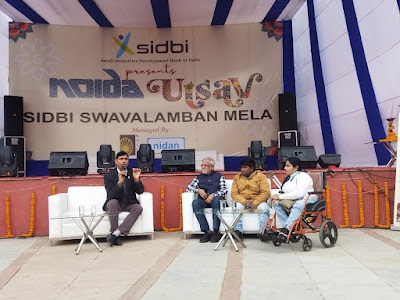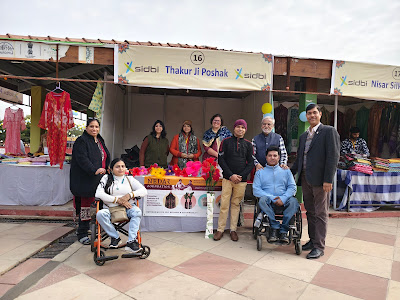 |
| Mr. Vashishth leading the discussion |
The Panel had three speakers in addition to Mr. Vashishth. Mr. Rajendran of NEDAR Foundation, Mr. Sonu Ram, a person who has organised grass root self help groups of persons with disabilitiess in outer Delhi and Ms. Kishwar, a women entrepreneur who vends regularly in weekly haats who shared their expreiences of challenges they face, opportunities they explored and what do they think is the way forward.
 |
| Panelists posing for a photo with disabled entrepreneurs |
Key Takeaways from the Panel Discussion:
1. Street Vendors: Unsung Heroes of Entrepreneurship
The discussion shed light on the fact that many street vendors are individuals with disabilities. As entrepreneurs, they engage in street vending activities not only for livelihood but also for self-reliance. The panel emphasized the need for equal opportunities and enhanced accessibility in the infrastructure of vending spaces and sanitary facilities near vending zones which is a crucial element of inclusion particularly for women vendors with disabilities.
2. Representation on Town Vending Committees
A crucial takeaway was the call for the representation of persons with disabilities on the Town Vending Committees established under the Street Vendors (Protection of Livelihood and Regulation of Street Vending) Act, 2014. This step is vital in ensuring that policies are inclusive and considerate of the unique challenges faced by differently-abled street vendors.
 |
| Mr. Vashishth with entrepreneurs at the NEDAR stall |
3. Mainstream Organizations: Catalysts for Change
NASVI and similar mainstream organizations were encouraged to include street vendors with disabilities and disability experts on their advisory bodies. Informed decisions and robust advocacy are essential for protecting the legitimate rights of the differently-abled, making the journey towards inclusion more effective.
4. Urban Planning for Accessibility
The discussion pointed out the critical role of urban planning authorities (Urban Local Bodies) in creating accessible vending zones. Recommendations included incorporating accessible features in built spaces and information and communication services (such as apps), reserving 5% of spaces for disabled vendors, and providing additional areas for parking mobility devices, wheelchairs, tricycles, or specially designed accessible vending carts.
5. Coexistence of Accessibility and Livelihood
A fundamental principle emerged from the dialogue: the right of accessibility and the right of livelihood must coexist as complementary factors. When notifying an area as a "vending zone," local authorities should ensure that footpaths, sidewalks, pavements, or streets remain accessible and usable by pedestrians and persons with disabilities, without being encroached upon by vendors.
Conclusion
In conclusion, the enthusiasm and engagement witnessed during this panel discussion serve as a powerful reminder of our collective responsibility to create a more inclusive and accessible world. We extend our heartfelt thanks to all participants for their valuable contributions. Let's continue working together, fostering an #InclusiveCities movement and championing the cause of #DifferentlyAbledEntrepreneurs. Together, we can make a lasting impact on the #EmpowermentJourney towards true #InclusionChampioning.
Special thanks to #SIDBI and #NASVI for their dedicated efforts in making this impactful dialogue possible and #NEDARFoundation and #CABEFoundation for initiating Inclusion discussion. The journey has just begun; let's continue striving for a world where inclusivity is not just a goal but a reality.
#InclusiveCities #AccessibilityAdvocate #EmpowermentJourney #InclusionChampion

No comments:
Post a Comment
Thank you for posting your comment. The website has a mechanism of allowing pre-approved comments to avoid spam. The comment if passing the spam test would be live in 24 hours.